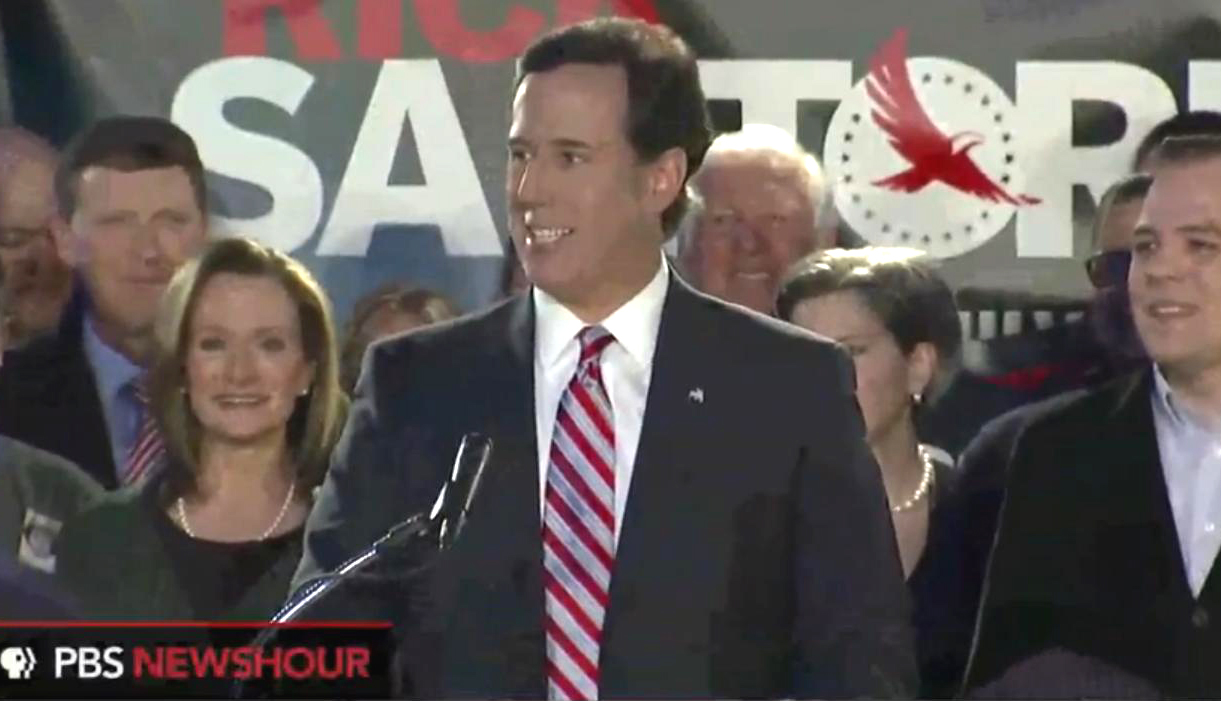
DES MOINES, Iowa (BP) — Surging Republican presidential candidate Rick Santorum won a plurality of support from evangelicals in the Iowa GOP caucuses Tuesday, as social conservatives in the state and nationwide try to decide not just who can win in November but who best shares their beliefs.
Mitt Romney edged Santorum in the Iowa caucuses by a mere eight votes — the closest GOP presidential contest ever — and remains a frontrunner for the nomination heading into the Jan. 10 New Hampshire primary, where he is favored. Yet concern by some voters over Romney’s conservative credentials has allowed a series of dark-horse candidates to rise to the top, with Santorum being the latest. The virtual tie (each received 25 percent) was a big boost to Santorum, who trailed by double digits in most Iowa polls just two weeks earlier and who had far less money than Romney.
Santorum won 37 percent of the vote of those who consider themselves born-again or evangelical, besting Ron Paul (18 percent) and three candidates (Romney, Rick Perry, Newt Gingrich) who each received 14 percent of the evangelical vote, according to entrance polls. Evangelicals made up 57 percent of caucus goers.
“God has given us this great country to allow His people to be free and has given us that dignity because we are a creation of His, and we need to honor that creation,” Santorum told a cheering crowd. “And whether it’s the sanctity of life in the womb or the dignity of every working person in America to fulfill their potential, you will have a friend in Rick Santorum.”
A former U.S. senator from Pennsylvania, Santorum long has been a champion of pro-life and pro-family causes and was a leading supporter of a proposed federal constitutional amendment in 2004 that would have defined marriage as between one man and one woman. He also helped lead the charge to pass a ban on partial-birth abortion, once getting into a now-famous floor exchange about the beginning of life with pro-choice Sen. Barbara Boxer.
But Romney, too, was a strong advocate for pro-life and pro-family causes when he was Massachusetts governor, leaders in his state say. Romney was governor when the state’s highest court issued its landmark ruling legalizing gay “marriage,” and he fought not only for a marriage amendment to the state constitution but one on the federal level, and in 2004 traveled to Washington, D.C., to testify before a Senate panel in support of a federal amendment. He said at the time that “forcing marriage to mean all things will ultimately define marriage to mean nothing at all.” He once even threatenedto withhold pay raises for state legislators if they didn’t vote on a marriage amendment.
On Dec. 30, several social conservative leaders in Romney’s home state issued a joint letter to “fellow conservative friends,” saying that Romney is a true social conservative. Among the signees was Joseph Reilly, former chairman of the board of Massachusetts Citizens for Life, Kristian Mineau, president of the Massachusetts Family Institute, and Gerald D. D’Avolio, former executive director of the Massachusetts Catholic Conference.
“Some press accounts and bloggers have described Governor Romney in terms we neither have observed nor can we accept,” the letter (available at http://bit.ly/rx88XE) reads. “To the contrary, we, who have been fighting here for the values you also hold, are indebted to him and his responsive staff in demonstrating solid social conservative credentials by undertaking the following actions here in Massachusetts.”
While Romney was governor, the leaders said, he: 1) fought for abstinence education, 2) vetoed a bill that would have provided access to the “morning-after pill,” which can cause abortions, and vetoed an embryonic stem cell research bill, 3) fought hard to overturn the court’s gay “marriage” decision and 4) enforced an obscure 1913 law that prevented out-of-state gay couples from getting “married.”
“Absent this action [on the 1913 law], homosexual couples would surely have flooded into Massachusetts from other states to get ‘married’ and then demanded that their home states recognize the ‘marriages,’ putting the nation only one court decision away from nationalizing ‘same-sex marriage,'” the letter reads.
The leaders said they are aware of Romney’s past position supporting abortion rights when he ran against Sen. Edward Kennedy in 1994. But they say Romney “has learned much since 1994 — to the benefit of our movement and our Commonwealth.”
Iowa pro-lifers, though, went with Santorum, who captured 58 percent of those who said abortion was their most important issue, according to entrance polls. Romney got 7 percent of that vote.
Among voters who said a candidate’s ability to defeat President Obama is most important, Romney won 48 percent, Santorum 13 percent.
Richard Land, president of the Southern Baptist Ethics and Religious Liberty Commission, said the caucus results show that evangelicals are engaged.
“Clearly social conservatives are alive and well,” he told Baptist Press. “Sixty percent of the people who voted in the Iowa caucuses were self identified Evangelicals and 60 percent of evangelicals voted for either a Mormon or a Catholic. This should lay to rest any negative stereotypes about evangelicals voting a narrow denominational preference.
” … It appears that there will be an ongoing debate in the primaries between Romney and the non-Romney and it further appears that the non-Romney will be Santorum, who is the truest of true blue social conservatives.”
Santorum’s strong showing among conservatives means that instead of being a sideshow at two key debates in the next week, he will be a major player. Debates from New Hampshire will be televised Saturday at 9 p.m. Eastern (ABC) and Sunday at 9 in the morning Eastern (NBC). If Santorum doesn’t do well in Tuesday’s New Hampshire primary — that state borders Romney’s home state — he would have a chance to bounce back Jan. 21 in the South Carolina primary, which has a voting bloc more suitable for him.
The Iowa caucus results forced out Rep. Michelle Bachmann, who finished sixth and announced the next day she was withdrawing.
The unpredictable nature of the GOP race has left some political pundits wondering what might have been had others joined the race or had not dropped out.
“Regardless of how Santorum does in New Hampshire next week, I can only imagine how Mitch Daniels, Paul Ryan, Chris Christie, John Thune, Sarah Palin, and even Jeb Bush must be kicking themselves for not getting in the race,” wrote Steven F. Hayward, a resident scholar at the American Enterprise Institute, at NationalReview.com. “Above all, Tim Pawlenty should never have gotten out; he would surely be in the hunt right now if he’d stayed in. And one other name comes to mind: Mike Huckabee, the 2008 winner in Iowa, might well be the frontrunner right now if he’d gotten in.”
–30–
Michael Foust is associate editor of Baptist Press.
Get Baptist Press headlines and breaking news on Twitter (@BaptistPress), Facebook (Facebook.com/Baptist Press) and in your email (baptistpress.com/SubscribeBP.asp).

















